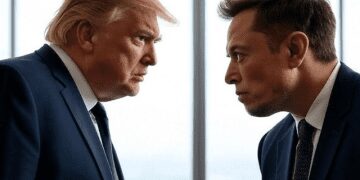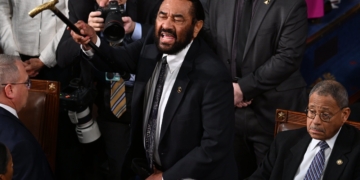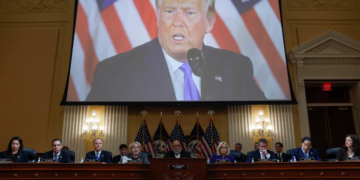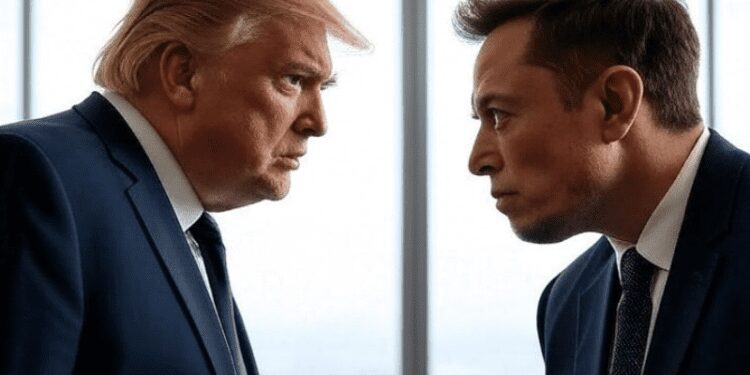From overwhelming love and unconditional support to estrangement, verbal abuse, and outright threats, the relationship between tech giant Elon Musk and President Donald Trump deteriorated in just a few months.
Were shared interests what brought them together? What led to this radical and unexpected shift?
Let’s review the stages of development of this controversial relationship, from its emergence on the political scene, and how it has evolved to this point.
Elon Musk was a prominent supporter of Hillary Clinton in the 2016 election
Elon Musk made no secret of his support for the Democratic candidate, Donald Trump’s opponent in the 2016 election. In an interview with CNBC, he stated that Trump did not reflect a positive image of the United States and that he preferred Hillary Clinton’s environmental and economic policies.
By 2022, the dispute between Musk and Trump escalated, particularly after the latter called him a con artist. Musk responded by saying that he was unqualified for the presidency due to his advanced age.
Marriage of Convenience 2024
By 2024, Elon Musk had become a major supporter of Donald Trump’s presidential campaign, donating approximately $275 million.
He also purchased the popular social media platform Twitter, renamed it X, and reinstated Donald Trump’s suspended account.
The two men demonstrated agreement on many issues raised during the campaign, such as freedom of expression, loosening censorship on social media platforms, criticizing political elites, and opposing sex-change operations for children.
Elon Musk’s efforts culminated in the success of his preferred candidate, who rewarded him by appointing him to head the Department of Government Efficiency (DOGE), responsible for reducing government spending.
Up until this point, everything reflected the trust, communication, and harmony between the two parties
The Tax Bill: The Beginning of the Controversy
In 2025, Donald Trump introduced a massive tax bill that included a legislative package with tax cuts and bigger government spending.
While this bill seemed beautiful and wonderful to Trump, it was ugly and disgusting to Elon Musk, threatening all his efforts to cut spending and, according to his claim, would increase the national debt by $5 trillion in record time.
This prompted Musk to resign from his position on the Commission on Efficiency of Government after only 129 days in office.
Trump began treating Musk differently, expressing his displeasure whenever he attempted to attend a government meeting during his resignation.
On June 5, Musk attacked the bill on social media, and Trump responded on his website, Truth Social, saying that Musk would not have succeeded without the government support his companies receive.
Public Conflicts and Threats
On June 6, 2025, Donald Trump threatened to terminate government contracts with Elon Musk’s companies, such as Tesla and SpaceX, claiming this would save Washington thousands of dollars. This threat, which quickly became a breaking news story, caused Tesla’s stock to drop by 14%, costing Musk an estimated $34 billion in a single day.
In response, Elon Musk claimed that his support for Trump was a direct factor in his victory. He also released recordings showing Donald Trump’s relationship with Jeffrey Epstein and that his name was included in the files of his famous lawsuit, before later deleting this statement from his personal account.
Musk did not stop there, but threatened to pull the SpaceX Dragon spacecraft, which transports American astronauts to the International Space Station, threatening to halt the American space program because there is currently no alternative.
Elon Musk also announced his intention to create and fund his own political party to compete with the Republicans in any upcoming elections

Peak Escalation
This July, the dispute escalated to the point that US President Donald Trump hinted at the possibility of returning Elon Musk to South Africa, despite his decades-long US citizenship.
On the other hand, Elon Musk reiterated his allegation of Donald Trump’s relationship with Jeffrey Epstein, a sex trafficker.
The conflict escalated, with Trump describing Musk as insane, while Musk described Trump as ungrateful.
The situation did not stop there, as Trump exerted economic pressure on Musk, threatening to cut government tax support for Tesla, which would put the company at risk of losing an additional $1.2 billion annually.
Why was Elon Musk angry about Trump’s proposed tax bill?
The bill contradicts the goals of Musk’s government efficiency authority, which seeks to streamline government bureaucracy and cut spending. The bill would add an estimated $5 trillion to the national debt.
This made Elon Musk feel that his presence in the Trump administration was pointless.
The elimination of the $7,500 electric vehicle subsidy would undoubtedly impact Tesla, impacting costs and raising prices.
The national debt would increase because the tax bill does not cover government spending, threatening further deficits.
Musk felt personally neglected. After spending nearly $275 million on Trump’s campaign, voting for him, and mobilizing support for him, Trump
backed away from his plan to cut spending simply to appease a few politicians.
From “Love” to Rivalry:
Musk’s alleged declaration of his “love” for Trump (“I love @realDonaldTrump as much as a straight man can love another man”) reflects the strong alliance they formed in 2024, when they were “partners” who shared a vision for the economy and were at odds with the elite. However, this rapprochement was shattered by a dispute over government spending and Trump’s economic policies.
Deportation Threat:
Trump’s threat to deport Musk, albeit symbolic, reflects his attempt to pressure him by targeting his identity as a former immigrant. This threat came in the context of a personal escalation, in addition to the threat to review government contracts with Elon Musk’s companies. Donald Trump told his interviewers: “We might have to put DOGE on Elon. You know what DOGE is? DOGE is the monster that might have to go back and eat Elon. Wouldn’t that be terrible?”
Each side has sought to target the other’s weaknesses (Trump’s files on the Epstein case, Musk’s government contracts)
The essence of the conflict:
The dispute is not just personal; it reflects a deeper struggle over economic policy and the future of the United States. Musk advocates innovation and spending cuts, while Trump continues his populist agenda even if it increases the national debt.




















